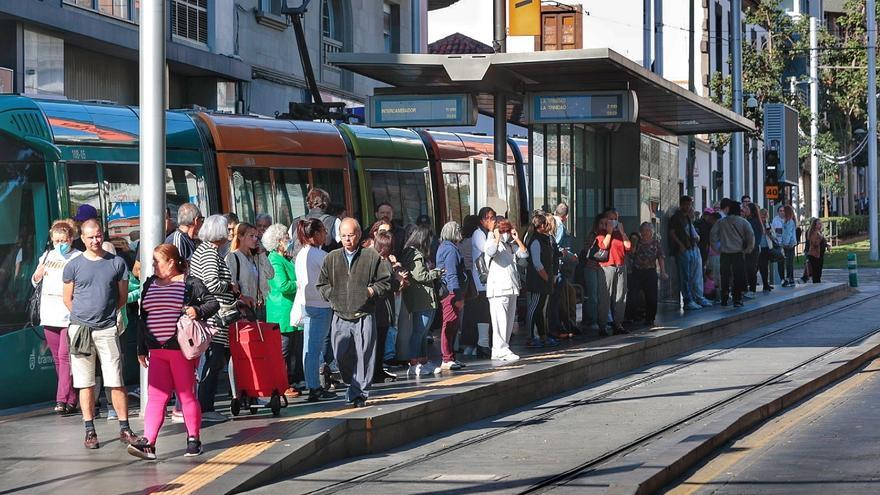
This morning at the El Cardonal stop, a crucial meeting is taking place at the tram depots. It’s D-Day and H-Hour to settle the latest conflict at Metrotenerife, which began last Friday. The key lies in the meeting between the company’s employee committee and the company’s representatives, who report to the Cabildo, whose island Mobility advisor will attend the meeting. The novel element is the presence of mediator Mónica Molina, a ULL professor, expert in Labour Relations and conflict mediation, chosen by the parties at the request of the island corporation. Her goal is to unlock the situation that has led to the current indefinite strike since last Monday.
The strikes started on Monday in three time slots – from 7:00 to 9:25 in the morning; from 13:00 to 15:00 and from 20:00 to 22:00 – with a minimum service set at 80%. Nevertheless, the strikes are noticeable, especially in the early hours, with longer lines than usual at the main stops. At 14:00, the frequency at Cruz de Señor was 12 minutes, when the normal frequency is every five minutes. This coincides with the time when three major institutes in the area let out, causing overcrowding on the buses coming from La Laguna. Passengers even have to enter from the back.
Testimonials
A driver from line 014 along the main road says: “Since yesterday (Monday) when the strike began, it’s been like this during peak hours. Many students never take the bus, but now feel compelled to, and I don’t want to leave anyone stranded because everyone has the right to travel.” On the other hand, a young student emphasizes: “Not being able to catch the tram means almost arriving home late. I have to transfer at the interchange and will definitely miss the bus. I’m going to end up stranded for hours.”
Silica Dust
Metrotenerife workers demand, among other things, the elimination of silica dust in the braking systems, the development of the equality plan, or more measures to prevent work accidents. The company’s employee committee argues that Metrotenerife “does not take into account the prevention delegates for this study and, therefore, does not recognize the occupational disease.” They argue: “They provide PPE to personnel who are not regularly exposed to respirable crystalline silica dust (RCS) but refuse to evaluate these job positions.”
“Inefficiency”
The worker representatives claim that there has been “inefficiency” in the meetings by the Metropolitano management to resolve the conflict. They add that since November 13, when the majority voted for the strike in the assembly (the workforce consists of 202 people), “the company only proposes one or no meeting for each committee (equality, training plan, reorganization of professional groups…). They emphasize that “once the strike was proposed on January 17 (based on 32 points, mostly related to Human Resources), they summoned us on February 5 without enough time to reach any suspension agreement.”
Mediator
The workers’ legal representatives requested mediation from the Canarian Labour Tribunal (TLC) “to have a guarantor entity that would set a meeting schedule and provide guarantees for compliance with those scheduled for the 14th and 15th of this month.” Before the first one, the Cabildo’s lawyer indicated that the TLC has no jurisdiction over companies of the island Corporation and that is why it did not take place. Subsequently, the advisor presented the company’s employee committee with the name of a mediator, the labour relations expert, Mónica Molina García. Eulalia García evaluates that the negotiations are “well underway” and points out that “there will be a solution, at least a suspension as a preliminary step to a definitive one,” because “there are many points of consensus.” She concluded: “We have always tried to ensure the safety of workers and users.”















